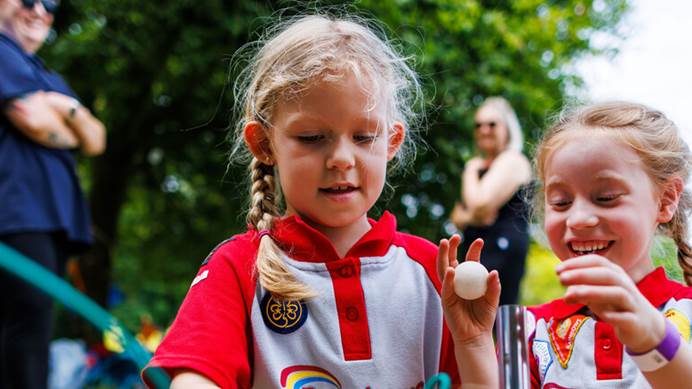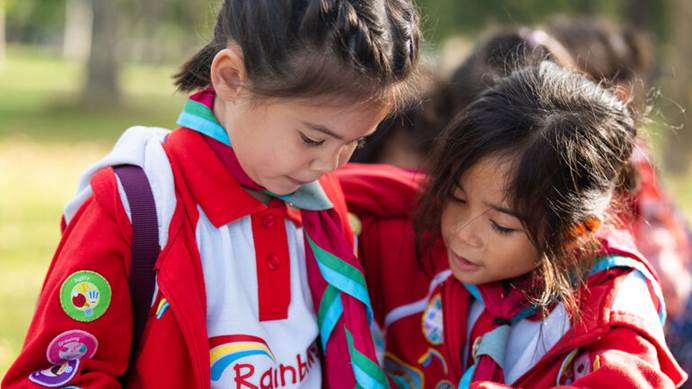Investigation procedure
The procedure every appointed investigator must follow when looking into a concern
Page last updated 31 March 2025.
See change log for recent updates to this procedure.
If an adult volunteer’s behaviour doesn’t meet Girlguiding’s expectations, we need to investigate to find out what happened.
If concerns are raised about an adult volunteer’s behaviour that can’t be resolved informally, we'll start an investigation.
The aim of the investigation is to resolve any concerns raised.
Who's this procedure for and when is it used?
This procedure must be used by all investigators looking into a concern. Investigators look into concerns raised under one of our policies, such as our:
- Complaints policy.
- Managing concerns about adult volunteers policy.
- Safeguarding policy.
- Whistleblowing policy.
This procedure doesn’t apply if a statutory agency, like the police or children’s services, is investigating safeguarding or any other concerns.
What does Girlguiding mean by an investigation?
An investigation is the formal, objective process of thoroughly looking into and examining concerns raised to gather all available information and become fully informed about it.
Which HQ teams support investigations and investigators?
The safeguarding and complaints and compliance teams are the teams who’ll be on hand to support investigators.
Pre-investigation assessment
When someone first reports a concern to HQ or a country or region, the appropriate HQ teams will assess the concern and decide if the threshold for a formal, full investigation is met. In some circumstances an informal resolution may be a more efficient way to resolve the concern.
Informal resolution
If the concern doesn’t involve a breach of our policies or procedures, it may be appropriate to resolve the issue informally. These types of concerns can include joining enquiries, waiting lists or how activities are run.
Please note that all safeguarding concerns must be reported to the HQ safeguarding team, and they’ll advise on appropriate next steps.
Where it’s decided that an informal resolution is the best way forward, we’ll pass the concern on to a senior volunteer, like a commissioner, who’ll give advice on next steps. The concern can later be investigated formally if necessary.
If an issue is resolved informally, the senior volunteer looking into the concern doesn’t need to write an investigation report. But they must still speak to all parties and send a written notice confirming the concern has been resolved. The senior volunteer may also share a copy of any relevant meeting notes with those involved.
Formal investigation
If an informal resolution isn’t possible or appropriate, a formal investigation will start.
Advice must be sought from the relevant team at HQ, and/or your country or region before any investigation begins. They’ll oversee and manage all investigations.
A formal investigation will always be needed if:
- There’s a safeguarding allegation.
- We need to gather more information, clarity or evidence from others.
- There may have been a breach of our policies or procedures. Someone may have committed a criminal offence, for example, theft of unit funds.
The relevant HQ team will inform the person who reported the concern that a formal investigation is beginning and give them the name of the investigator. They’ll also notify appropriate volunteers within the country, region or county.
How do we appoint investigators?
Country or region volunteers with relevant safeguarding experience will investigate safeguarding cases. We may appoint an investigator from a different country or region if needed.
In most other cases, the investigator will be the local commissioner. If they’re involved in the concern, or unable to remain objective due to their relationships with people involved, the relevant HQ staff member or country or region volunteer will appoint someone else to investigate. This could be a local commissioner from another area, or a volunteer experienced in doing investigations.
In more complex cases, the relevant HQ team may ask an external professional to investigate.
All volunteer investigators need to have completed a safe space level 4.
What are my responsibilities as an investigator?
As an investigator you must:
- Meet our expectations as set out in our volunteer code of conduct.
- Review and understand the relevant policy and procedure the concern was reported under.
- Follow the investigation process as laid out below and detailed on the investigation report, including sticking to timeframes.
- Keep the relevant commissioner, country or region volunteer and member of staff up to date on your progress.
- Keep a record of your actions, including who you’ve been in contact with and when. We recommend that you fill in the investigation report as you go along, as this will help keep information factual.
- Keep information relating to the investigation safe and secure, as set out in our managing information policy and procedure.
- Report any further safeguarding concerns to our HQ safeguarding team as soon as you come across them.
A safeguarding practitioner or complaints and compliance officer will be assigned to the case that you’re investigating. They’ll give you advice and support throughout the investigation.
If your investigation relates to an appeal, your approach, remit and timeframe may be different to what’s laid out below. This will be agreed between you and the relevant HQ team before you get started.
Investigation process
Once you’re appointed as investigator, you’ll be given an investigation report. This will include:
- The details of the concern.
- Information of the policy or procedure that may have been breached.
- The details of the people who need to be contacted.
- The concerns that need to be investigated.
- Any other relevant information.
When you’ve read through the report, discuss with the relevant HQ team member to make sure you have everything you need to proceed.
You must:
- Discuss what support is available to those involved in the investigation.
Volunteers involved in investigations must be offered a safe practice liaison volunteer (SPLV). The safe practice liaison volunteer’s role is to offer emotional support whilst the investigation is ongoing.
If at any point you or the assigned safe practice liaison volunteer feel the volunteer under investigation would benefit from more support, please contact the relevant HQ team or signpost them to appropriate support organisations.
- Discuss what reasonable adjustments those involved in the investigation might need.
You shouldn’t begin the investigation until adjustments are in place.
- Agree the order in which you’ll contact everyone involved.
We recommend starting with the person who reported the concern. This will reassure them you’ve received their concern.
- Agree how the subject of the investigation will be informed of the concerns.
Ideally this should be done verbally by their commissioner.
If you aren’t their commissioner, this is an opportunity to check in with the relevant HQ team member what the subject of the investigation has already been told about the concerns and if they’ve been offered a SPLV.
The first thing you should do as the investigator is contact everyone involved. Details should already be listed on the investigation report sent to you by the relevant HQ staff member.
Initial contact can be made by phone, email or in person. But care and consideration must be given to this step, as being involved in an investigation can be stressful.
In this initial contact stage, introduce yourself as the investigator. Make sure everyone involved understands the investigation process and try to agree a suitable date, time and place to hold your meetings. Explain that meetings are usually virtual, and any face-to-face meetings should be arranged in line with policy. You must also agree any reasonable adjustments or support needed with everyone involved.
If you’re unable to get in contact with the person who raised the concern or the person the concern is about, let the relevant HQ staff member know. Depending on the concern and the information you already have, the investigation may be able to continue without their input. If this isn’t possible, we may close the case.
Meetings can be held in person, by phone or virtually. You should meet each person separately. Anyone can have a supporter with them at meetings for moral support, but they mustn’t answer questions on the person’s behalf.
In all meetings
- Take accurate notes during the meeting. These need to be exactly what was said and not your reflection after the meeting. If possible, have someone at the meeting who’s there just to take notes.
- Be open-minded and curious about the situation you’re investigating. Don’t make any assumptions, and gather as much evidence as you need to confirm the details.
- Share these notes with everyone who attended, ideally within 48 hours, to check for accuracy. This helps make sure nothing has been misinterpreted.
- Explain to everyone involved that you might need to speak to them again to clarify information.
For more advice on these conversations take a look at our approaching sensitive conversations guide.
During your conversation with the person who raised the concern
- Try to get a good understanding of their concern.
- Be clear about what we can and can’t take forward.
- Ask them what outcome they’re hoping for, if appropriate.
- Let them know you’ll keep them updated on how the case is progressing.
During the meeting with the person the concern is about
- Share the details of the concern and give them the opportunity to respond.
- Explain the policy or procedure the concern relates to.
- Let them know you’ll keep them updated on how the case is progressing.
You must update everyone involved on the progress of the investigation regularly. We recommend sending an email update at least once a month. You should also send these updates to the relevant team at HQ.
Gathering information and evidence
Your investigation will involve gathering all the relevant facts from the person raising the concern, the person under investigation and anyone with relevant information. You must send all gathered information to the relevant HQ team staff member.
This could include:
- Meeting notes.
- Emails or letters sent and received. This may include emails or letters sent between the person complaining, the person under investigation and others, as well as emails or letters you’ve received from them.
- Other physical evidence – this could include risk assessments, attendance registers, photos and videos, forms or payment records.
If new information emerges at any point during your investigation which suggests that there could be a safeguarding concern, you must contact the HQ safeguarding team immediately. If appropriate, you can suspend an investigation whilst you seek further advice. Our safeguarding team will advise and support you on next steps.
If you think a crime has been committed, you must contact the relevant HQ staff member. Again, a suspicion is enough to suspend the investigation until you take advice.
Use the investigation report to record your actions during the investigation. This should include:
- Your timeline of investigation actions.
- Your investigation findings. This should include a summary of your findings and any relevant information. You should use the evidence gathered to show how you reached each decision.
- Any additional concerns that have been identified during the investigation.
- Your investigation conclusion. For each section you should decide whether you feel the concerns have been upheld or not. Or for safeguarding cases, whether they’re substantiated or unsubstantiated.
Once you've finalised your report, liaise with the relevant HQ staff member to discuss the investigation and consider if all objectives have been met.
When the report has been agreed and finalised, the relevant HQ staff member will discuss the proposed outcome with the relevant commissioner, HQ manager and the region chief commissioner.
If the concerns have been upheld or substantiated, even partially, a range of outcomes may be put in place. This is in line with our managing concerns about adult volunteers policy. The region chief commissioner will need to approve any sanctions.
If an investigation into a safeguarding concern identifies further risks, the HQ safeguarding team may need to take further actions. For example, a safeguarding risk assessment may be completed.
The HQ staff member will use your report to write the outcome letters which will be shared with the person who raised the concern and the subject of the investigation.
If the outcome involves a sanction, the relevant commissioner should have a meeting with the volunteer to discuss this and address any follow up actions, such as training, mentoring or additional support required.
Outcomes should be shared with the subject of the investigation before the person who raised the concern.
The person raising the concern won’t be informed about the details of any sanctions taken against volunteers.
After the investigation outcomes have been issued, the case will be closed.
You must pass on all relevant information and evidence to the relevant HQ team for secure storage. After we’ve confirmed we’ve received this, you must destroy any information you hold on paper and delete files and emails. We’ll keep appropriate information in line with our relevant retention schedule and our managing information policy.
An appeal against the outcome of a case can be requested by the person who raised the concern, or the volunteer who was under investigation. Further information can be found in the appeals and review procedure.
Change log
March 2025 - updated version published. The investigation toolkit given to investigators has been improved in line with volunteer feedback, and the investigation procedure has been updated accordingly. The procedure now gives more information about each step of the investigation process and how investigators carry out each step.



